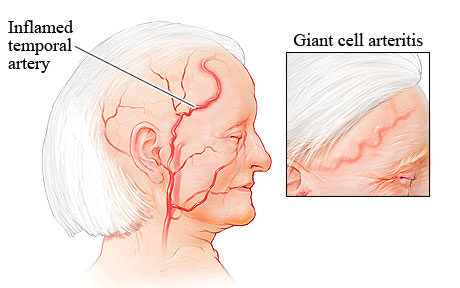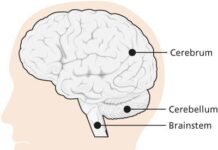Giant-cell arteritis (GCA), also known as temporal arteritis, is an inflammatory disease that affects the large and medium-sized arteries. The condition primarily involves the arteries in the head, especially the temporal arteries, but it can affect other arteries as well. GCA is the most common form of vasculitis in adults over the age of 50 and can lead to serious complications, including vision loss and stroke, if not treated promptly.
Symptoms
Common symptoms of GCA include:
- Headaches: Severe, persistent, and usually located in the temples.
- Scalp tenderness: Pain when touching the scalp or combing hair.
- Jaw claudication: Pain in the jaw muscles while chewing.
- Vision problems: Blurred vision, double vision, or sudden, permanent loss of vision in one eye.
- Fatigue: General feeling of tiredness.
- Fever: Low-grade fever.
- Weight loss: Unintended weight loss.
- Polymyalgia rheumatica: Pain and stiffness in the neck, shoulders, and hips.
Causes
The exact cause of GCA is unknown, but it is believed to be an autoimmune disorder where the body’s immune system attacks the arteries. Factors that may contribute to the development of GCA include:
- Age: Most commonly affects individuals over 50.
- Gender: More common in women than men.
- Genetics: Family history of GCA or other autoimmune diseases.
- Infections: Some infections may trigger the immune system.
Treatment
Prompt treatment is essential to prevent complications, especially vision loss. The main treatment options include:
- Corticosteroids: High doses of corticosteroids (such as prednisone) are typically prescribed to reduce inflammation. Treatment usually starts with a high dose, which is gradually reduced over several months to a year.
- Tocilizumab: This immunosuppressive drug, often used in conjunction with corticosteroids, can be effective in reducing symptoms and the need for long-term steroid use.
- Aspirin: Low-dose aspirin may be prescribed to help reduce the risk of blood clots.
- Monitoring and follow-up: Regular check-ups and monitoring are necessary to adjust treatment and manage side effects.
Prevention
There is no known way to prevent GCA, but early diagnosis and treatment can help prevent complications. Regular medical check-ups and being aware of the symptoms, especially if you are in a high-risk group, can aid in early detection.

































